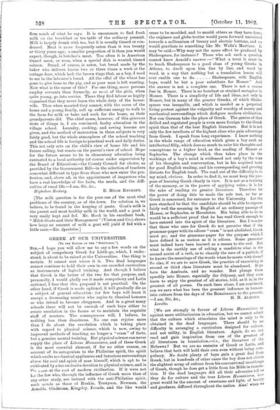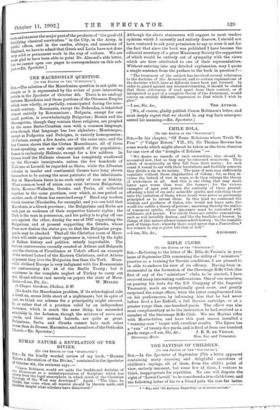GREEK AT OUR UNIVERSITIES.
rTo THE EDITOR OP THE " SPECTATOR.".1
hope you will allow me to say a few words on the subject of compulsory Greek for Little-go, which, I uncle'. stand, is about to be raised at the Universities. One thing is certain. It cannot rest where it is. Two dead languages cannot continue to hold their own in our crowded curriculum as instruments of logical training. And though I believe that Greek is the better of the two for that purpose, and, personally, I would gladly see it made compulsory and Latin optional, I fear that this proposal is not practical. On the other hand, if Greek is made optional, it will gradually die as a subject of general education : for few boys will learn it except a decreasing number who aspire to classical honours or who intend to become clergymen. And in a great many schools there will not he enough of such boys either to create emulation in the forms or to maintain the requisite staff of masters. The consequences will, I believe, be nothing less than disastrous. No one can rejoice more than I do about the revolution which is taking place with regard to physical science, which is now, owing to improved methods of teaching, no longer a " cram " of facts, but a genuine mental training. But physical science can never supply the place of Literae Humaniores, and of these Greek is the most essential element, if for no other reason, on account of its antagonism to the Philistine spirit, the spirit which exalts mechanical appliances and luxurious surroundings above the soul and spirit of man himself, which is apt to be cultivated by a too exclusive devotion to physical science, and is the a ,,rm at the root of modern civilisation. If it were not fiR the few who, through the influence of Greek more than of any other study, are imbued with the anti-Philistine spirit, such minds as those of Ruskin, Tennyson, Newman, the Arnolds, Gladstone, Kingsley, Froude, and the like would cease to be moulded, and to mould others as they have done; the en'gineer and globe-trotter would press forward unresisted towards a millennium of luxury and electric buttons, and we would gravitate to something like Mr. Wells's Martians. It may be said,—Why may not the same effect be produced by Shakespeare, for instance ? Those who ask such a question cannot know Arnold's answer :—" What a treat it must be to teach Shakespeare to a good class of young Greeks in Athens, to dwell upon him line by line, and word by word, in a way that nothing but a translation lesson will ever enable one to do Shakespeare, with English boys, would be but a poor substitute for Homer." And the answer is not a complete one. There is not a coarse line in Homer. There is no bombast or strained metaphor in Homer. There is a simplicity of life and ideas, not only in Homer, but in many of the greater Greeks, of which Shake- speare was incapable, and which is needed as a perpetual living protest against the vulgarity and worship of money and mechanical surroundings which disfigure modern civilisation. Nor can German take the place of Greek. The genius of that drilled and regulated people is even more foreign to the Greek spirit than that of the best English literature. But it is not only the few intellects of the highest class who gain advantage from Greek. I speak from long experience. I know nothing in the whole range of education which gives a boy such an intellectual fillip, which does so much to raise his thoughts and conceptions to a higher level, as the reading of Homer or Sophocles. The change which thus takes place in the workings of a boy's mind is evidenced not only by the tone of his thoughts and conversation, but in his acquired taste for good English reading, and his corresponding and growing distaste for English trash. The road out of the difficulty is, to my mind, obvious. In order to find it, we must keep the pur- pose of learning Greek clearly in view. It is not as a training of the memory, or in the power of applying rules ; it is for the sake of reading its greater literature. Therefore let the power of doing this be made the sole test, so far as Greek is concerned, for entrance to the University. Let the pass standard be that the candidate should be able to express fairly well the meaning in English of an ordinary passage of Homer, or Sophocles, or Herodotus. His being able to do so would be a sufficient proof that he has read Greek enough to have entered into the spirit of the literature. But I wonder that those who care for Greek do not perceive that if the grammar-paper with its odious " cram " is not abolished, Greek must go ; and the grammar-paper for the purpose which I have defined is as useless as it is odious. Some grammar must indeed have been learned as a means to the end. But what is the earthly use of asking a candidate what is the second aorist of a verb, or to classify the uses of a particle, if he knows the meanings of the words when he meets with them? So also, if we are to save Greek, the practice of examining in second or third class literature must be abandoned. Boys hate the Anabasis, and no wonder. But plunge them speedily into Homer, especially the Odyssey, and they soon learn to enjoy the greatest of all stories, told, as it is, in the greatest of all poems. On such lines alone, I am convinced, can we save what has been the greatest influence in human- istic culture from the days of the Renaissance to the present.
[We are strongly in favour of Literae Humaniores as against mere utilitarianism in education, but we cannot admit that the culture which stimulates the mind is only to be obtained in the dead languages. There should be no difficulty in arranging a curriculum designed for culture, and not utility, in English literature. Again, do we not read and gain inspiration from one of the greatest of all literatures in translation,—i.e., the literature of the Hebrews ? But we are no enemies of Greek or Latin, and believe that both will hold their own even without being com- pulsory. No doubt plenty of boys gain a great deal from Greek, but in hundreds of other eases the boy does not obtain the slightest scrap of culture from his conventional mouthings of Greek, though he does get a little from his Bible in transla- tion. If the dead languages did all their advocates tell us they do for culture and the true .Literae Hutnaniores , how great would be the amount of sweetness and light, of beauty and goodness, diffused throughout the nation. Alas! when we turn and examine the major part of the products of "the good old fortifying classical curriculum" in the City, in the Army, in public offices, and in the castles, abbeys, and mansions of England, we have to admit that Greek and Latin have not done very solid or permanent work in the way of culture. We are most glad to have been able to print Dr. Almond's able letter, but we cannot open our pages to correspondence on this sub- ject.—En. Spectator.]











































 Previous page
Previous page